Urban Chaos: Riot Response
Time for T-Zero.
Killing me softly
In fact, Rocksteady indulges rather too heavily in the opportunities to show off its ragdoll death animations in slow-mo, but at quick stab of the X button soon sees normality return once you tire of the effect. In its favour, though, Urban Chaos is one of the few PS2 shooters to employ Havok physics successfully, with crates, bodies and static objects flying asunder at regular intervals. All round, the engine deserves credit for pushing the creaking architecture with a number of impressive effects, such as heat distortion, particle effects and a consistently decent use of fire throughout. In such a tight, claustrophobic game as this, the developer keeps the focus firmly on detail. That said, once you've seen one burned out building you've kinda seen them all; it certainly won't win any awards for variety, put it that way.
The level design is patchy, too, with several drawn-out rescue scenarios forcing you to traipse around the same darkened smoky environments with little guidance of where to go, and thermal goggles that you'll barely use. Occasionally you'll rely on the help of willing firemen, who'll (using a simple d-pad command interface) chop through doors and barricades, put out fires, carry the injured and yank open shutters, but you'll often wonder why the game didn't just give you the choice of doing all of that yourself - you are the ultimate one-man army, after all.
Eventually, the sheer repetition of choking around the same dimly lit areas repeatedly will see you through, but the game is at its weakest when it forces you to do this. At its best, it's literally turning up the heat; pouring enemies at you from the flaming deathtraps and making it feel like a one-man-war in hell. When you're really tested to use your ammo wisely and accurately it feels a skilful, intense affair, but does occasionally run the risk of overstepping the mark with overly harsh checkpoint placement that results in dull and lengthy repetition. At its worst, you'll suss out rare (and rather unforgivable) instances where enemies respawn, where you're best to simply steam through an area rather than linger and try and take everyone down. But gaining such intimate knowledge of the inconsistent inner workings of Rocksteady's level design decisions can be a fairly drawn-out process during the game's more brutal tests. With patience and no small amount of head shot-based marksmanship, though, Urban Chaos can be a satisfying if wholly repetitive blast.
Don't believe the truth

With decent, but not remarkable shooting fun constituting a solid platform for Urban Chaos, where it starts to win you over is in the finer details. The knowledge that meeting the headshot quota gains you a medal makes you a better, more patient player. Likewise, trying not to kill Burners makes you change tact, too: you'll start to use the shield more to deflect enemy bullets and tazer them once you're up close, rather than wade in all guns blazing. And seeking out the hidden gang masks makes you a more thorough, exploratative kind of player, while going through the level without dying also lends a more old school arcade feel to the game. By layering the routine shooting action with all these extra tasks, Rocksteady subtly shifts the emphasis away from it being yet another run-and-gun slog against another bunch of identikit foe. With this more challenging, rewarding arcade structure encouraging replay, you can't help but like the game a little bit more than you would have otherwise. No-one would argue that it's the last word in action shooters, but plenty of rival developers will be looking at its excellent reward system and want to ape it in future titles. Sure, TimeSplitters has adopted a vaguely similar structure in the past, but Urban Chaos goes far beyond in terms of solidly and seamlessly integrating it into the main fabric of the gameplay - and ends up benefiting significantly.
Inevitably, though, a well thought-out reward system can only do so much for a game that's so determinedly repetitive throughout. Occasional changes of scene like the train level or the chopper fly-by shootout promise to up the ante, but, in truth, the well-worn dynamic of clearing a room full of suicidal, ultra aggressive foes wears a little thin after a few hours. Urban Chaos is one of those games that probably isn't best feasted upon (as we inevitably have to do in review situations), but sampled one chunk at a time. Played over a stretch, the general grind and repetition wears you down, whereas focusing on doing one level at a time - but doing it properly - can feel pretty satisfying.

That said, anyone who's gorged on all the shooters out there will admire the positives that Urban Chaos has to offer, but struggle to justify rating it above some of the big names out there. Sure, the arcade structure's a big plus point, and the prospect of countless upgrades encourages you to play it in a completely different way than you'll be used to. Even then, though, you'll wince slightly at the uninspired level design or the one dimensional enemy AI which mainly charges headlong at you, or just stands around and waits for you to take your opportunity. There's no sense that you're facing a highly trained, tactically organised bunch of terrorists, but a dim bunch of thugs that want to jump off buildings and swear profusively at every given opportunity. At the very least, Urban Chaos deserved to have a better repertoire of enemy, and neither is it asking too much for Rocksteady to design slightly more interesting and varied levels. Bolting on basic, eight player online/LAN play doesn't hurt, but it's a) not a patch on what's already available in a dozen other shooters, and b) you won't find many people playing it online even if you do take the plunge.
Flip you, you melon farmer
A few hours of unsophisticated, expletive-strewn ultra violence is pretty good fun in small doses, but don't be surprised if you end up swearing like a sailor after prolonged sessions. Lengthy play of Urban Chaos is a double-edged sword, in fairness. You'll come to admire the arcade structure and the way it taps into gamers' motivations to unlock everything, but the longer you play it, the more you'll spot the cracks in the AI, the level design and some bloody weird bugs. There's definitely potential here for a more ambitious, big budget sequel for the next generation of consoles, but as things stand Urban Chaos firmly occupies that difficult 'rent it if you're in need of a shooter fix' category.
To get noticed in a genre as saturated as the dear old first person shooter, you've got to do things a little differently - sadly Urban Chaos doesn't quite go far enough.
